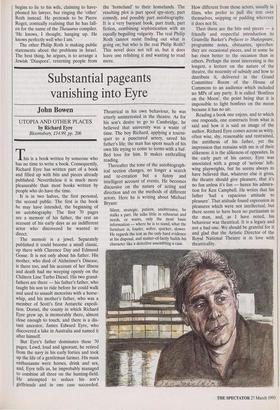Substantial pageants vanishing into Eyre
John Bowen
UTOPIA AND OTHER PLACES by Richard Eyre Bloomsbury, £14.99, pp. 206 his is a book written by someone who has no time to write a book. Consequently, Richard Eyre has written part of a book and filled up with bits and pieces already published. Nevertheless it is much more pleasurable than most books written by people who do have the time.
It is in two halves, the first personal, the second public. The first is the book he may have intended, the beginning of an autobiography. The first 70 pages are a memoir of his father, the rest an account of his early days as an indifferent actor who discovered he wanted to direct.
The memoir is a jewel. Separately published it could become a small classic, up there with Clarence Day and Edmund Gosse. It is not only about his father. His mother, who died of Alzheimer's Disease, is there too, and his account of her illness and death had me weeping openly on the Chiltern Line Turbo Diesel. His two grand- fathers are there — his father's father, who taught his son to ride before he could walk and used to assault motorists with a horse- whip, and his mother's father, who was a member of Scott's first Antarctic expedi- tion. Dorset, the county in which Richard Eyre grew up, is memorably there, almost close enough to touch, and there is a dis- tant ancestor, James Edward Eyre, who discovered a lake in Australia and named it after himself.
But Eyre's father dominates these 70 pages. Lewd, loud and ignorant, he retired from the navy in his early forties and took up the life of a gentleman farmer. His main enthusiasms were horses, drink and sex, and, Eyre tells us, he improbably managed to combine all three on the hunting-field. He attempted to seduce his son's girlfriends and in one case succeeded. Theatrical in his own behaviour, he was utterly uninterested in the theatre. As for his son's desire to go to Cambridge, he believed that university was a waste of time. The boy Richard, applying a tourni- quet to a punctured artery, saved his father's life; the man has spent much of his own life trying to come to terms with a baf- fled love for him. It makes enthralling reading. Thereafter the tone of the autobiograph- ical section changes, no longer a search and re-creation but a funny and intelligent account of events. He becomes discursive on the nature of acting and direction and on the methods of different actors. Here he is writing about Michael Bryant:
Silent, strategic, patient, unobtrusive, he stalks a part. He talks little in rehearsal and needs, or wants, only the most basic information — where he is to stand, what the furniture is, louder, softer, quicker, slower. He regards the text as the only hard evidence at his disposal, and matter-of-factly builds his character like a detective assembling a case.
How different from those actors, usually in films, who prefer to pull the text over themselves, snipping or padding wherever it does not fit.
Then there are the bits and pieces — a friendly and respectful introduction to Granville Barker's Prefaces to Shakespeare, programme notes, obituaries, speeches: they are occasional pieces, and in some he has risen better to the occasion than in others. Perhaps the most interesting is the longest, a lecture on the nature of the theatre, the necessity of subsidy and how to distribute it, delivered in the Grand Committee Room of the House of Commons to an audience which included no MPs of any party, It is called 'Bonfires on the Moon', the point being that it is impossible to light bonfires on the moon because it has no air.
Reading a book one enjoys, and to which one responds, one constructs from what is said and how it is said an image of the author. Richard Eyre comes across as witty, often wise, shy, reasonable and restrained, the antithesis of his father, yet the impression that remains with me is of their alikeness: it is the alikeness of opposites. In the early part of his career, Eyre was associated with a group of 'serious' left- wing playwrights, but he seems always to have believed that, whatever else it gives, the theatre should give pleasure, that it's no fun unless it's fun — hence his admira- tion for Ken Campbell. He writes that his father 'had a rapacious attitude to pleasure'. That attitude found expression in pleasures which were not intellectual, but there seems to have been no puritanism in the man, and, as I have noted, his behaviour was theatrical. It is a legacy and not a bad one. We should be grateful for it and glad that the Artistic Director of the Royal National Theatre is in love with theatricality.


























































 Previous page
Previous page